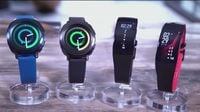Earlier this summer, Health and Human Services Secretary Robert F. Kennedy Jr. set in motion a sweeping vision: a future where every American wears a health-monitoring device. The department, he announced, is preparing for one of the largest advertising campaigns in its history to encourage adoption of wearable health tech. "We think that wearables are a key to the MAHA agenda, Making America Healthy Again, and we are gonna, my vision is that every American is wearing a wearable within four years," Kennedy Jr. declared, as reported by Fox 32 Chicago. It’s a bold ambition, and one that’s already stirring debate far beyond the halls of government.
For some Americans, the idea of strapping on a smartwatch or fitness band is nothing new. Soroush Shah, a graduate student at Northwestern University, has been using his smartwatch daily for five years. "The health and physical activity tracking features on the watch are helping a lot with tracking the calories I burn out during the day and the week and helps me track the performance," Shah told Fox 32. He’s not alone—wearables are increasingly common among those seeking to monitor their health, track workouts, or simply nudge themselves toward more active lifestyles.
At Northwestern’s Habits Lab, where Shah works as a PhD candidate, researchers are designing the next generation of wearable health devices. Christopher Romano, the lab’s research coordinator, explained that their mission is to fill the gaps in health information. "We look for ways wearable sensors can fill in gaps in the health information we have about people," Romano said. Their projects range from developing devices that use thermal cameras to monitor cigarette smoking episodes—tracking individual puffs, intensity, and speed—to wrist-worn UV meters that help users understand their exposure to cancer-causing ultraviolet rays.
But as the movement toward ubiquitous wearables gains steam, so too do concerns about privacy, data security, and the potential for overreach. Even Shah, who is immersed in wearable research, admits to some hesitation. "But there are some privacy concerns that comes with it, you know, health information or sensitive. And I know that's an active area of research. People are working on it. But that may be one hesitation that I have about variables. All of this data that's been actively collected, where does that go?" he wondered.
These worries are not unfounded. According to a 2019 Journal of the American Medical Association article cited by Fox 32, insurance companies could potentially use health data collected by wearable devices to raise costs for some consumers. Many wearables track sensitive information—weight, eating habits, blood pressure—and the question of who owns and accesses this data is a growing concern. As Dr. Nabil Alshurafa, director of the Habits Lab, put it: "Well, I do applaud his ambition. When we're thinking about healthcare, especially in the United States, we have a very sort of reactive approach to healthcare, and a lot of people now call it sick care." While Alshurafa agrees that wearables can be effective in managing chronic disease, he cautions that "there isn't sort of this magic bullet wearable that everyone can wear that's gonna solve everyone's problem." In his research, he’s seen people lose interest in wearables after just a month, or six months at most. "Until the user really sees a clear benefit to their health, then they're unlikely to wear it, right. And so, forcing them is just not going to be the right solution," Alshurafa said.
Medical professionals echo this sentiment. Dr. Sean Swearingen, Director of Sports and Exercise Cardiology at Rush University Medical Center, told Fox 32 that while wearables can motivate some to exercise, they aren’t necessary for everyone. "Do I think necessarily having all of that data is going to improve your exercise performance? I wouldn't say that that is necessarily going to change," Swearingen said. He also warned that too much data could lead to unnecessary worry or more doctor appointments: "With some of those types of data, it can cause an element of over-concern. For something that is just a piece of data and doesn't necessarily have a tremendous effect in how their long-term health is gonna look."
Cost is another barrier. The price of wearable devices ranges from $50 to $350, and insurance coverage is spotty at best. Some hospitals, like Rush University Medical Center, offer programs where patients can obtain wearables covered by insurance—including Medicare and Medicaid in some cases. But for many Americans, the price tag remains a hurdle.
These debates over health data privacy are not taking place in a vacuum. On July 24, 2025, the California Privacy Protection Agency (CPPA) unanimously approved new, first-in-the-nation privacy regulations. As reported by Bloomberg Law, these rules impose stringent requirements for cybersecurity, risk assessments, and oversight of automated decision-making technology on businesses operating in California. The regulations aim to strengthen consumer protections while balancing business concerns through phased reporting deadlines and scaled-back compliance requirements. The CPPA’s expanded oversight now covers any business handling personal data of customers, employees, and the public, signaling a broader national reckoning with digital privacy.
Meanwhile, the federal government is facing its own design and data challenges. On August 22, 2025, an article highlighted President Trump’s new executive order, "America by Design," which promises government services that are not only usable but visually appealing. The article stresses that execution—rather than words—will determine the initiative’s success. Among the recommendations: rehiring top designers previously let go, restoring successful projects like the IRS’s Direct File program, and fixing the Paperwork Reduction Act’s sluggish approval cycles. But perhaps most crucially, the article underscores that “great design in government depends on trust, which is currently broken due to data abuses and mishandling of personal information.” The administration is urged to comply with existing privacy laws and to enforce zero tolerance for data misuse.
For everyday Americans, the question of how much personal data is being collected—and by whom—extends far beyond government services or health tech. As highlighted in a Lifehacker article published August 22, 2025, social media apps from companies like Google and Meta are among the worst offenders for data collection and sharing. Even seemingly innocuous apps—weather apps, ad-supported games, or food delivery services—can quietly amass significant personal information and share it with third parties. Security and privacy experts, like Thorin Klosowski of the Electronic Frontier Foundation, advise users to review app permissions, limit location sharing, and opt for privacy-focused alternatives when possible. Apps like Signal, for instance, collect only a phone number and do not share data with third parties, a stark contrast to the data-hungry practices of larger platforms.
Ultimately, the push for a healthier, more connected America is colliding with a growing unease about digital surveillance and loss of privacy. As Kennedy Jr.’s campaign gears up, and as states like California forge ahead with tough new privacy rules, the nation stands at a crossroads: will Americans embrace the promise of wearable tech, or will concerns over data security and personal autonomy prove too great a hurdle? For now, the answers—and the data—are still being collected.






